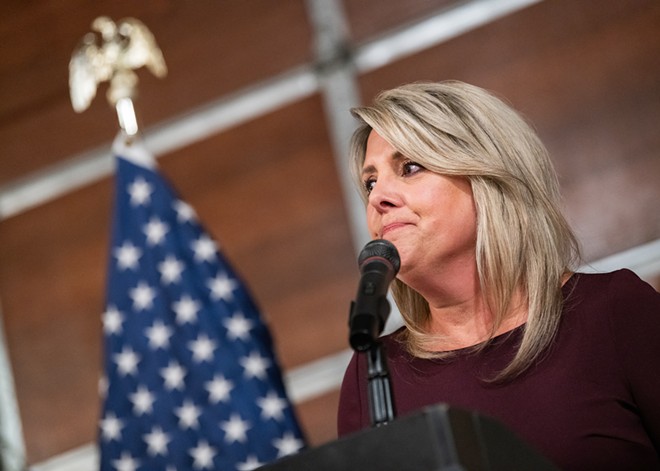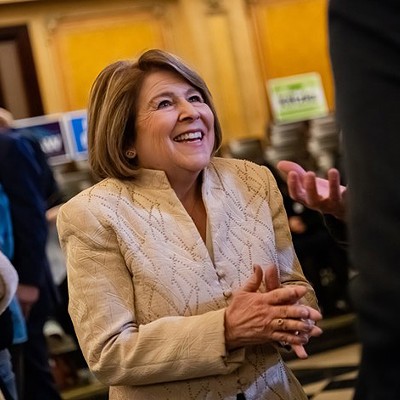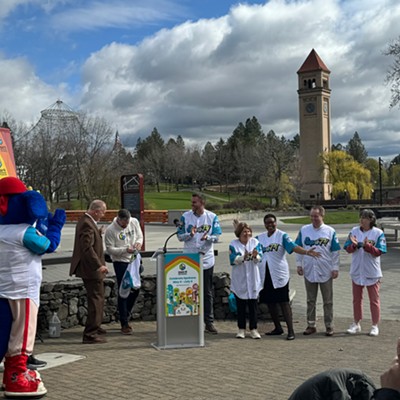
It wasn't because she didn't have enough money. During her run for reelection this year, Spokane Mayor Nadine Woodward broke the all-time record for direct contributions in a Spokane mayoral race. Conservative political action committees also spent a whopping $767,547 in support of Woodward — more than five times what liberal groups spent supporting her opponent and the ultimate victor, Lisa Brown.
But the money didn't work. Between direct contributions and outside spending, the total cost per vote for Woodward ended up being $40, compared with $18 for Brown. Brown won by 4%.
So what happened? Why did Woodward lose?
It's impossible to know the mind of every voter, but here are a few theories about why Woodward's reelection bid failed.
1 SPOKANE DOESN'T LIKE INCUMBENT MAYORS
Woodward launched her reelection bid with a major disadvantage: She was already mayor. Over the past five decades, Spokane has only reelected one mayor: David Condon in 2015.
"Spokane voters tend to sour on mayors after four years, no matter how successful they are," says Logan Camporeale, a local historian who closely watches local elections.
Blaine Garvin, a political science professor at Gonzaga, adds that while incumbency is generally considered an advantage in congressional races, it can be a disadvantage for mayors, who are "more visibly responsible in the eyes of voters for what happens."
Spokane's almost-50-year streak of one-term mayors is a little unusual compared to other cities, Garvin says, but not unprecedented.
2 WOODWARD TAPPED INTO PERCEPTIONS OF CHAOS DOWNTOWN, AGAIN
When the Inlander published a list of reasons why Ben Stuckart lost the mayoral race in 2019, reason No. 3 was that Woodward had "tapped into perceptions about chaos downtown."
She did the same thing this year — and it might have hurt her.
"I think that was the main strategic error," Garvin says. "It's hard to know how she could have avoided that, but I think it did do damage."
Woodward's campaign rhetoric frequently touched on public safety, drug use and homelessness. But slogans like "Make crime illegal again" are hard to sell when you've been the one in charge for four years.
"It seems like she's running against an incumbent," Garvin says.
Woodward blamed Spokane's problems with drugs and crime on the City Council and "reckless" state policy. But Paul Dillon, who won south Spokane's District 2 City Council seat, says he talked to a lot of voters who were tired of the finger-pointing.
"I've never seen an incumbent run that way," Dillon says. "I think it left a really confused and muddled message."
3 SHE PROMISED TO ADDRESS HOMELESSNESS — BUT IT GOT DRAMATICALLY WORSE
Woodward's messaging problem also applies to homelessness. The issue was a key part of her 2019 campaign pitch, but during her four-year term, Spokane's annual point-in-time count shows the city's homeless population increased by 50%.
Dillon acknowledges that liberal-led cities across the West Coast also saw a dramatic increase in homelessness during the same time period, and that the issue is shaped by a variety of factors. But he argues that Woodward's lack of progress was still a major factor on voters' minds.
Cornell Clayton, a political science professor at Washington State University, agrees: "To make that the centerpiece of her campaign, again, I think it really raises the question: 'Well, why hasn't this been dealt with? Why is it getting worse rather than better?'"
4 THE PANDEMIC WAS GENUINELY TOUGH
After the first ballot drop showed her trailing on election night, Woodward took to the stage to thank her supporters — and reflect on the challenges of her first term.
"A global health pandemic... a summer of protests, our first riot. 'Defund the police.' Unprecedented workforce shortages. A housing crisis. Camp Hope."
Woodward enumerated that same list of challenges in almost all of her campaign interviews and speeches this year. Camporeale says it may have sounded like excuse-making for voters, but at the same time, he says it would be unfair to suggest that COVID wasn't a unique challenge that previous mayors didn't have to deal with.
5 MATT SHEA
Getting national media coverage because you prayed on stage with a former state representative who was accused of domestic terrorism and religious extremism is generally considered a very bad campaign strategy.
Controversy over Woodward's August appearance with Matt Shea dragged on for months, even as Woodward claimed that she didn't know he would be at the prayer event and didn't agree with his politics. Dillon says he thinks Shea's political toxicity pushed away a lot of moderate voters.
Garvin and Clayton are less sure if the incident ended up having a major impact.
"I thought it would, but I'm thinking maybe it didn't," Garvin says. "But it was embarrassing, let's just say it didn't do her any good."
6 THE NEGATIVE ADS DIDN'T STICK
Conservative political action committees spent $401,547 on a barrage of attack ads against Brown, while liberal groups spent $122,647 attacking Woodward. Brown says she was prepared for an onslaught of attacks, and that much of the messaging was recycled from her run for Congress in 2018.
Garvin questions the effectiveness of attack ads. He says most voters are used to it and simply tune it out.
Clayton thinks attack ads can be effective, but only in certain contexts — like when you're a challenger taking on an incumbent. He thinks the attack ads' heavy focus on crime and homelessness may have ultimately backfired.
7 BROWN IS A SAVVY POLITICIAN
Brown, who served nearly 20 years in the state Legislature, has decades of experience running for office. Outside of her run for mayor in 2019, Woodward has none.
Clayton describes Brown as a "very effective political organizer," noting her success at mobilizing volunteers during her run for Congress.
Clayton also thinks that — despite having policy positions that are mostly similar to Stuckart — Brown was able to more effectively position herself as a pragmatic moderate. He says she also spoke to the business community "in a way that doesn't frighten them the same way someone like Ben Stuckart did.
"When you have a challenger like that," Clayton adds, "and then you have an incumbent who is running this counterintuitive campaign complaining about the state of affairs in the city, I think that's a recipe for an upset." ♦

























